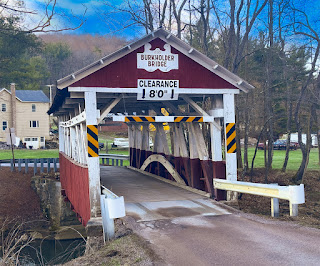The first 8.5 mile-long section of the proposed 9-11 Memorial Bike Trail from Garrett to the 9-11 crash site near Shanksville follows the path of the old Buffalo Valley Railroad through the valley of Buffalo Creek from Garrett to Berlin.
 |
| The Casselman River at Garret (click on photos for enlargements) |
 |
| Buffalo Creek just above where it flows into the Casselman |
The Buffalo Valley Railroad was established in 1871 by businessmen in Berlin and farmers in the Buffalo Valley. It was later sold to the B&O Railroad. As of now the bike trail ends a little over a mile outside of Garrett, just before the Route 219 Overpass.
Another mile further on, the proposed path of the trail passes right by the Burkholder Covered Bridge. Built in 1870 the 47-foot-long bridge is one of seven in Somerset County utilizing the one-span Burr-Arch type of construction. The Buffalo Valley Railroad probably made a stop here.
 |
| Burkholder Bridge. The proposed bike trail route can be seen on the right. |
 |
| Burkholder Bridge |
 |
| Burkholder Bridge |
 |
| Buffalo Creek |
Another 1.7 miles up the valley is the Beachdale Crossing, another station stop on the old Buffalo Creek Railroad. Once a community of sorts it is now known for the Beachdale Brethren Church.
 |
Owl Hollow Creek, also known as Tubs Run, flows into the Buffalo just before Beachdale. Notice the plastic tubing for collecting maple sap.
|
 |
| Beachdale Brethren Church |
 |
| Route of the proposed bike path looking south from Beachdale |
 |
| Route of the proposed bike path looking north from Beachdale |
Another two miles up the valley is the old village of Raineytown, named after W. T. Rainey, a coal operator who opened a mine near here. The village itself was established in 1898 and consisted of sixteen or more houses for coal miners. At first the village was known as Red Raineytown because all the houses were painted red. The stop here on the Buffalo Valley Railroad was known as the Pine Hill Station, named after the village of Pine Hill about a mile southwest of here. Local farmers brought their milk here for shipment to a creamery in Berlin. There was a large company store in the village but it burned down in 1903. In 1921, during the Prohibition Era, authorities raided a still used to make moonshine in the basement of one of the dwellings. Now only two houses remain in Raineytown.
 |
| Route of the proposed bike path looking south from Raineytown |
There was once a Native American village to the right of the trail beyond the house. To my knowledge it has never been officially investigated, but numerous artifacts, including arrowheads and hatchet heads, have been found here. Every time the farmer plowed the field where the village was located new artifacts would turn up.
 |
Route of the proposed bike path looking northeast from Raineytown
|




















